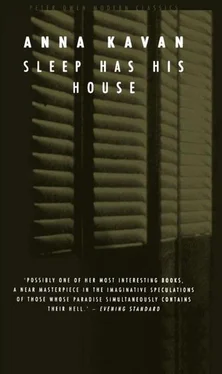B herself is often surprised when she is wandering in the passages to find that she has come to a door which she has never seen before. And this is particularly apt to happen just when she feels that she has at last mastered the plan of the different floors.
It almost seems as if alterations were continually taking place in the outlying parts of the house, certain rooms changing their shape or position or even disappearing entirely, and other new rooms proliferating in distant corridors: while the main part of the construction, the hall, kitchens, dining-room, library, principal bedrooms and so on, remain more or less stabilized. Certainly, minor changes are liable to occur even in these rooms; but they are unimportant and chiefly confined to differences of furniture, decoration or general arrangement. Thus, in place of a window, there may one day appear some ancient half-indistinguishable portrait of a state dignitary in solemn robes. And then very possibly within a few hours a window will again have taken the picture’s place: but this time the window, instead of overlooking the street as before, will be facing on to a formal paved yard, bounded by high walls, and with a clipped shrub growing in each comer.
On the face of it, this looks like a lot of unnecessary expenditure of energy. It’s hard to conceive any acceptable explanation of such changeability; unless the proprietors have adopted some complicated eclectic system with regard to the place. The best way, as in all these obscure matters, is simply to accept the situation without inquiring into causality, which would most likely be incomprehensible even if brought to light.
B, in any event, does not speculate about what goes on. These constant unpredictable variations, which some people might find disconcerting, to her constitute one of the great charms of the house. The pleasant anticipation of novelty turns the opening of every door into an adventure.
How does a girl like B feel, you may wonder, alone in this great dark place? The question can be answered in four simple words: B is at home. And she’s not lonely either. Her companions are the many mirrors which hang all over the house in the various rooms. Probably there has never been a house which contained as many mirrors as this one. Mirrors framed in every imaginable style, from the huge glass in the salon with its magnificent eagle whose wide wings, glimmering with dim gilt in the dusk, seemed poised already in imperial flight, to the convex circle, no larger than a plate, which microcosmically reflects in steely recession the window at the turn of the stairs and a whole pinpoint Breughel landscape beyond. Long cheval glasses lean inquiringly in the bedrooms like strangers wishing to ask the way. In alcoves, in the passages, on landings, you will unexpectedly catch, just as you sometimes catch someone else’s eye in a crowd, the subdued and watchful gleam of a mirror. And in every one of these mirrors B recognizes the fair-haired girl who is her closest friend.
Even without this mirror friend there would be plenty of entertainment to be had just by looking out of the windows. Sometimes, on certain days or in certain rooms, the curtains are drawn, and then of course it’s inadvisable to attempt to look outside. But usually there is nothing to prevent you from studying the view. What a variety of views there are too. That’s what makes window-gazing from this house so delightful.
Perhaps it’s Christmas-time in the street. You can sit on the wide window-seat sheltered by a wine-coloured velvet curtain and watch the snow feathers falling. The children are throwing snowballs as they run home in the twilight, their cheeks are bright red, they wear ear-muffs and warm mittens and little round caps made of fur. Their movements are like a dance. What a joy it is to watch such spontaneous happiness.
The tongues of the bells in the church steeple at the end of the street dart sharp and clean as icicles in the freezing air. The sky is the deep blue of sapphires, the snow bums blue-white, lighted windows blossom one after the other.
In the house opposite they are having a party. A huge holly wreath tied with red satin ribbon hangs on the door knocker. Gold light streams from the windows, and inside you can see the gorgeous Christmas-tree and the guests in their fine clothes. In one room people are dancing to the music of a piano and violin: in another, boys and girls are just sitting down to a table decorated with flowers and candles and toys. How gay all the faces are! What peace and friendliness inside the festive rooms; and the beautiful frozen night out of doors. It makes you feel warm and comfortable just to look at it all.
Or, maybe, delicate muslin ruffles are floating gently in and out of the open window in a warm breeze. The air enters scented with roses, with honeysuckle and clover, fresh with the smell of grass which men have been cutting all day long in the fields. Stripped to the waist, their torsos beautiful as light bronze, the strong young haymakers rhythmically swing their scythes through the final swaths. The heavy haywains lumber home in the dusk. From the village rises the sound of singing and laughter; a cheerful clatter of pans comes from the kitchens where women in bright aprons are preparing the evening meal. Lovers walk in the orchards under the ripening fruit. Grave and benign like archangels, the white winged mountains stand in the darkening sky.
Yes, there’s always something fascinating to be seen from the windows. And then there’s the house itself, a perpetual source of interest and surprise. Why, you could easily spend a lifetime investigating the library alone. Not to mention the pictures, the clocks, the tapestries, and the curious objects stored in the different rooms; the attics crowded with trunks, every one packed full of unimaginable and exciting treasures; the porcelain, silver, silk, crystal, ivory, jade, collected through many centuries and in many lands; the clothes folded away in the cupboards; the very pots and pans in the kitchen, the canisters full of strange spices, the herbs and cordials and preserves, the vast stone urnlike crocks on the storeroom floor.
It’s really impossible to mention even a fraction of the riches contained in a house so inexhaustibly endowed with wonders from all over the world, as well as with its own unique, complex, incomparable individuality. You get confused when you try to describe it; the mind is embarrassed by such a wealth of material; you hardly know where to begin or where to leave off.
Well, the line has to be drawn somewhere: and that’s why it seems useless to say any more except that no discriminating person would ever willingly leave such a house once they had taken up residence in it; or find any other house even tolerable afterwards.












